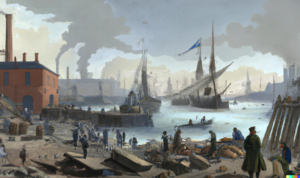(Created page with "<nowiki><tabs> </nowiki><tab name="City of Progress">{{:%n0c83}}</tab> Category:JAMathon 2022 Category:JAMathon Category:Breme Category:Location") |
No edit summary |
||
| Line 1: | Line 1: | ||
<tab name="City of Progress">{{:%n0c83}}</tab> |
|||
[[Category:JAMathon 2022]] |
[[Category:JAMathon 2022]] |
||
[[Category:JAMathon]] |
[[Category:JAMathon]] |
||
Revision as of 00:46, 28 September 2022
Novisk City - marketed as The City of Progress - was a large industrial city established late in the PR era. Located on the large Bremish island it took its name from, Novisk City became the new frontier after large deposits of rare minerals were discovered in the mountains. With its rapid expansion and development of industry, the city quickly grew to become a melting pot for people all across the realm seeking to build new successful lives for themselves.
History
Before 1183 PR, the settlement that would go on to become the city was little more than a small trading port for trappers, situated by a large natural harbour. Whilst the island had mostly been inhabited since the earliest humans first came to Breme, little of note had developed from the insular, scattered villages that dotted the landscape. The people there lived simple lives, living off the land and had little contact with the outside world.
That would change following the wrecking of the SS Tibeena, a cargo vessel northward bound for Gammelgard. One of the few surviving passengers to wash ashore was a young Hendrik Galberry, a geologist employed by Kwawa Industries, who would go on to discover the unique geological makeup of the island before returning to Isonhound. It wasn’t long before expedition teams were sent out, and base camps established.
Within only 5 years, many other industrial giants of the realm had made their way to that small trading port, beginning its transformation into the sprawling industrialist’s dream. By 1200 PR the city was already comparable to some in Oppidan, with companies such as Pendergras and Dark Son Industries bringing workers and employment opportunities. The vast majority of factories focused on non-magical production, due to the increasing demand for basics in a world ravaged by war. As a result, the city became well known for its engineers and developments in non-magical technologies.
Come the Fracturing of the Weave, the city found itself in a stronger position than many due to their lack of reliance on magic. They were able to propel themselves into the CR era, continuing their tradition of technological wonder.
Beyond the City
The island outside the city would remain mostly wild and untouched, save for mining operations. It wasn’t uncommon for people to face misfortune when venturing out into the wilderness; the superstitious village folk would attribute it to beings they’d call væsen. These spirits could be Trolls or Tomtar or any other creature, but were supposedly always invisible to all bar a select few blessed individuals. Most cityfolk dismissed these claims as old folktales and naïvety, however would often still keep to their paved grid streets and clay brick walls regardless.
Notable Locations
Galberry House
The simple manor house that would go on to become the city hall was originally owned by Hendrik Galberry. He lived in the city for 7 years as head of Kwawa’s operations, before his mysterious disappearance.
Tori Square
A large market square near the centre of town. It was often used as a meeting place for events, such as celebrations and large festive events, or protests for better working conditions. A market would be set up twice a month full of produce and crafted goods; one of the few occasions the village folk would come to the city.
University of Applied Sciences
The city developed a reputation for engineering excellence, driven in part by its modern top-class university. Students and professors from all across the realm were drawn to its practical approach to learning.The University owns several beautiful buildings across the city, mostly donated by the various companies who employ many of their graduates. Experiments of all sorts happen behind closed doors.

